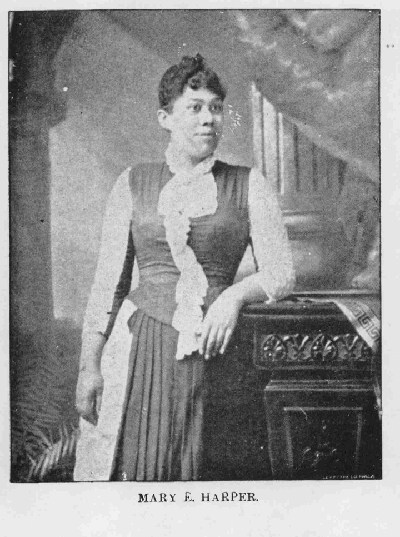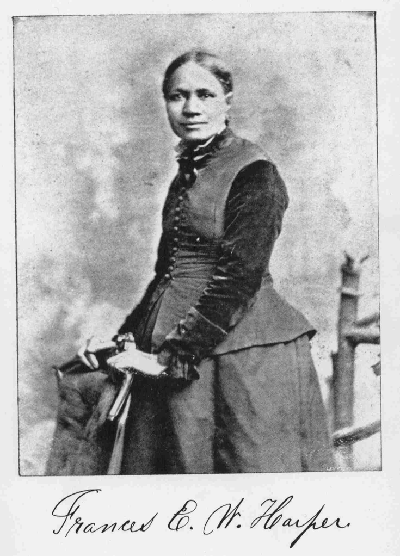“Every mother should endeavor to be a true artist.”
- Frances Ellen Watkins Harper (1892)
Last January, in the wake of the election, I found myself working on a new syllabus. I was about to teach a section of “The American Experience,” a history and sociology course required of all freshmen at my university.
Needless to say, it was…is…a strange, uncertain time to be contemplating “the American experience.” Our past, our future, our values as a nation are totally up for grabs.
As I was preparing for the class, I came across an 1866 speech by Frances Harper. Her words sent a powerful jolt of recognition and shame through me in 2017.
Image created by Kate Schatz and Miriam Klein Stahl.
I had known of Harper mostly in the context of American literature, my area of study in graduate school. She is recognized as one of the first black female novelists and arguably the first African American woman to have a short story in print. Her Reconstruction-Era dialect poems, voiced by ex-slave “Aunt Chloe,” are often anthologized and taught in college-literature courses.
But Harper was also a decades-long speaker and activist on abolition, women’s suffrage, and anti-lynching legislation.
In part, it was economic necessity that drove Harper's full-time return to the podium. Married in 1860, a year before the outbreak of the Civil War, Harper and her widower husband had bought a farm in Columbus, OH, probably with money that Harper had earned through lecturing gigs in the 1850s. In 1864, her husband died prematurely, leaving Harper to support herself, their daughter, and three stepchildren. With their farm seized, Harper was unable to keep the family together. She left the stepchildren with their in-laws and relocated east with daughter Mary.
Back to the speech. Harper delivered “We Are All Bound Up Together” to the Eleventh National Women's Rights Convention in May 1866. This was two years after her husband’s death, one year after the end of the Civil War.
I was struck by the strength and sheer badassery of Harper’s words. Sharing the stage with Elizabeth Cady Stanton and Susan B. Anthony, she called BS on white suffragettes’ prioritizing of their own ‘rights’ over the ‘wrongs’ of racial and economic injustice. (A bit of context: Harper was also addressing the lack of solidarity when many prominent white women in the suffrage movement opposed the 15th Amendment, which granted voting rights to black men, because it didn’t extend suffrage to women.)
I do not believe that giving the woman the ballot is immediately going to cure all the ills of life. I do not believe that white women are dew-drops just exhaled from the skies. I think that like men they may be divided into three classes, the good, the bad, and the indifferent. The good would vote according to their convictions and principles; the bad, as dictated by prejudice or malice; and the indifferent will vote on the strongest side of the question, with the winning party.
And here is her mic-drop-worthy conclusion (if she’d had one of those back in the day):
I tell you that if there is any class of people who need to be lifted out of their airy nothings and selfishness, it is the white women of America.
The statistics from the recent election – a majority of white women voted for Trump – immediately came to mind. Harper had anticipated, 150 years earlier, the arguments outlined in this article that a friend forwarded me in the 2016 election’s aftermath.
As I wrote in this post, parents get a bad rap for withdrawing from civic life into the nuclear family unit. But I wonder how much that statistic focuses on white, middle-class families. Mothers of color have always been at the forefront of social change and social justice movements in this country.
Although the historical record is sparse, there is evidence that Harper involved her daughter, who never married, in activist efforts. According to Foster, Mary's name appears on several political conference programs and committee rosters alongside her mother's. Harper also "lovingly dedicated" her pioneering novel, Iola Leroy, to Mary. (In a tragic coda to her story, Mary died in middle age, two years before Harper herself.)
One volume of Harper's poetry, Atlanta Offerings, featured Mary's photograph next to an image of her mother.
Given the lack of a definitive biography, I’m not sure what Harper thought of how becoming a parent shaped her art and her activism. As Frances Smith Foster writes in A Brighter Coming Day, even the logistics of how Harper maintained her rigorous travel schedule while solo parenting a young child are a mystery:
Unfortunately, we have no information about the effect that motherhood had upon her career or how Harper dealt with the problems of childcare. Perhaps, as her friend Ida B. Wells-Barnett did a few years later, Harper traveled with her child and hired someone to care for her while Harper was on the platform. Or like Jarena Lee, the A.M.E. minister earlier in the century, Harper may have left Mary with friends…. But it is clear that during the Civil War, Harper supported herself, her child, and the war effort through her lectures and the sale of her books.
Researching this post, I came across the closest articulation I could find of Harper’s parenting philosophy and motivations in an 1892 lecture titled “Enlightened Motherhood.” In the speech, Harper assumes the trappings of a rather conventional Christian framework, taking sex work and drunkenness as the main targets of her criticism. Harper’s argument also reminds me a bit of an earlier nineteenth century conversation about republican motherhood – basically, she calls on mothers to be educators of virtue in the home in order to eliminate social ills.
However! However, this passage, read in the aftermath of the Weinstein et al. revelations, also sent a flash of sympathy across the decades:
Are there not women, respectable women, who feel that it would wring their hearts with untold anguish, and bring their gray hairs in sorrow to the grave, if their daughters should trail the robes of their womanhood in the dust, yet who would say of their sons, if they were trampling their manhood down and fettering their souls with cords of vice, "O, well, boys will be boys, and young men will sow their wild oats."
…. How many mothers to-day shrink from a double standard for society which can ostracize the woman and condone the offense of the man?
Harper's 125-year-old call to socialize men to behave like decent human beings resonates with today's belated reckonings.
When the misogynist-in-chief, the racist-in-chief, was elected, I experienced paralysis as a writer. How could I devote time and resources to the biography of a dead white aristocrat, when there were so many other, more pressing issues to address? When one of my own students, academically brilliant and ambitious, was also facing the pressures and fears of being undocumented? Was this project really a meaningful use of my limited spare time as a parent?
One year later, I’m still unsure of how to answer these questions. I am writing my Lovelace book again, though. Curiosity is difficult to confine, or to direct in particular channels. Stories about the history and culture of science, although they sometimes touch on diversity and underrepresented voices, continue to compel me.
That doesn’t mean, however, that I’m absolved of the responsibility to, well, parent artistically. In "Enlightened Motherhood," Frances Harper charges us to be an artist and an architect of nothing less than our children’s moral universe. She recognizes that cultural shifts begin on the micro level of human character. My creative work doesn’t necessarily or exclusively need to center on ethics or social justice, but my parenting sure does.


